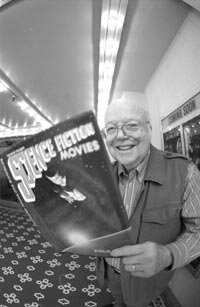NEWS- Farewell, George: Writers stunned, saddened by icon Garrett's death

Garrett hams at the Jefferson Theater for a 2003 story about his 1960s foray into screenwriting.
FILE PHOTO BY JEN FARIELLO
The final chapter in the colorful life of critically acclaimed novelist, essayist, and former Virginia Poet Laureate George Garrett was written Sunday night. The 78-year-old UVA writing professor died at his Rugby Road home "very peacefully," and surrounded by his three children and two grandchildren, says his wife, Susan. Garrett had been battling bladder cancer for 18 months.
UVA writing professor and one-time director of the Creative Writing program Sydney Blair sent the news out in a mass email to friends and colleagues on Memorial Day, and says her inbox has been flooded with tributes.
"They all can't quite believe it," says Blair, who met Garrett when she was his student in the MFA program in 1984 and subsequently worked both for and with him in the department. "We were all convinced he'd live forever," Blair says.
"I always think about him as being able to write the most beautiful, lyrical lines you could imagine," she says, "but he could also write this really punchy, dark, witty satire. And that's just in the prose range."
If Garrett is known and respected internationally for his literary works, he may be best remembered by some as the professor who launched 1,000 writers-– maybe more. And they weren't all UVA students. Although Garrett taught at UVA in the 1960s, he left after the University learned he hadn't completed his dissertation for his doctorate at Princeton. The Ivy League school awarded him the degree in the mid-'80s after determining his historical 1971 novel, Death of the Fox, qualified as a doctoral dissertation.
After teaching stints at several other schools, Garrett made a triumphant return to teaching at UVA in 1984, gladdening the hearts of creative writing students.
"If he liked your work, he'd do anything for you," says Jason Coleman, who studied under Garrett in UVA's MFA program in 1997 and 1998. Garrett, Coleman says, was "the textbook version of being generous with other writers."
Coleman's experience with his mentor echoes that of Hook writer Dave McNair, who studied under Garrett in the early 1990s. The professor taught his graduate classes at his house, McNair recalls, and looked out for his students in a variety of ways.
"He'd hire me to drive him to readings," McNair recalls. Although McNair says Garrett could have driven himself, "He'd pay me $150. He kept me afloat. I got a lot of writing done in those hotels."
McNair also learned the hard way that Garrett prized a good story.
"Once he was at a reading I gave," McNair says. "I had gas, I was reading, and I burped. A few weeks later, I kept hearing about the reading at which I farted. It was George rewriting history."
McNair says he fought for a while to set the record straight, but Garrett's storytelling charisma won out. "It was a much better story than burping," McNair admits.
Garrett's considerable oral storytelling skills translated well– and frequently– to written works. In addition to nearly a dozen novels, Garrett penned plays, short stories, essays, criticism, and poetry– and one of the campiest screenplays ever to hit the big screen, the 1965 sci-fi flick Frankenstein Meets the Space Monster.
The sheer variety of genres, McNair believes, might explain why Garrett didn't garner popular success to equal his critical acclaim. "You couldn't categorize him," says McNair, citing Garrett's poetry as among his favorite of Garrett's works. "They're really funny, kind of savage."
Blair agrees, adding that Garrett's generosity was matched by his biting wit.
"He could be wickedly bad at times and merciless if it was a person he didn't like," she recalls. "He had no patience with pretentiousness."
Although his Elizabethan Trilogy– Death of the Fox, Entered from the Sun, and Succession– nearly propelled him to household name status, Garrett never achieved the broad, best-selling fame of John Grisham or Stephen King.
"He was a writer's writer," Blair says.
Indeed, Garrett was a darling of critics– and of the boards who issue literary awards. Among his numerous honors were the T. S. Eliot Award, the PEN/Malamud Award for short fiction, the Lifetime Achievement Award from the Library of Virginia (2004), and the New York Public Library Literary Lion award. In addition to those and others, in 2002 Garrett was named Poet Laureate of Virginia, a post he held for two years.
Garrett's funeral is scheduled for June 7 at 11am at St. Paul's Memorial Church on University Avenue. Susan Garrett says a larger memorial service will be conducted "near fall," and says she hopes people will remember the "joy, laughter, and enthusiasm."
#